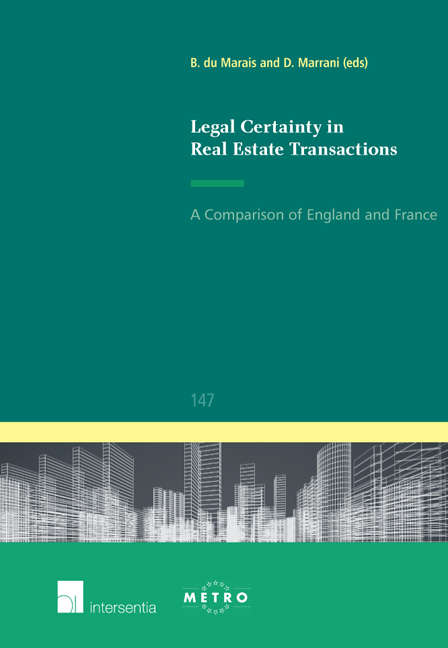Book contents
- Frontmatter
- Contents
- Introduction
- Part I The Idea Of Legal Certainty
- A Theoretical Approach
- B Practical Approach
- Part II Legal Certainty In Property Transaction: A Comparative Approach
- How to and Why Measure the Efficiency of Real Estate Transactions in France?
- Overview of how a Real Estate Transaction is Conducted in France
- Property Transactions in English Law: General Principles
- Commercial Leases in English Law
- Part III Measuring Legal Certainty
- Conclusion
- Miscellaneous Endmatter
Commercial Leases in English Law
from Part II - Legal Certainty In Property Transaction: A Comparative Approach
Published online by Cambridge University Press: 21 September 2018
- Frontmatter
- Contents
- Introduction
- Part I The Idea Of Legal Certainty
- A Theoretical Approach
- B Practical Approach
- Part II Legal Certainty In Property Transaction: A Comparative Approach
- How to and Why Measure the Efficiency of Real Estate Transactions in France?
- Overview of how a Real Estate Transaction is Conducted in France
- Property Transactions in English Law: General Principles
- Commercial Leases in English Law
- Part III Measuring Legal Certainty
- Conclusion
- Miscellaneous Endmatter
Summary
The role of the lawyer
Lawyers in the English legal system who work in a law firm partnership (or, very rarely, as a sole practitioner) are called solicitors. They are subject to extensive and strict regulation. Before 2007, the solicitors’ governing body, the Law Society, regulated the solicitors’ profession. Since 2007, a new independent body called the Solicitors’ Regulation Authority regulates the profession. The SRA has made the Solicitors’ Code of Conduct which contains mandatory rules and guidance which all solicitors must follow. Firms are regulated in matters relating to accounts and care of clients’ money, the provision of financial advice, relations with other lawyers, with clients, and with third parties. No solicitor may practise without a Practising Certificate.
Professional ethical standards under the Code of Conduct regulate dealings between lawyers so that one lawyer may not act in an unethical manner towards another. At the same time, the interests of the client are paramount. There are strict rules governing the relationship not only between lawyers but between the lawyer and his client and between the lawyer and a third party.
In this connection, it should be noted that in England, a sufficient level of professional indemnity insurance is compulsory; lawyers cannot practise without such insurance. Such compulsory insurance is by no means to be found in all European countries. Th e level of cover is objectively determined so that it is adequate to cover risk. Accordingly, if a client suffers loss because of the proven negligence of his lawyer, that loss will be wholly compensated by insurance.
Under Rule 3.07 of the Code of Conduct, the parties to a commercial lease (hereafter ‘lease’) must be separately represented. Of course, this is designed to avoid any conflict of interest. Not only the landlord and the tenant should have separate representation but also any surety and also any mortgagee. This contrasts with the civil code legal system in which a notary acts for both sides, and, to a degree, represents the state. This difference illustrates the fact that the English common law system is adversarial; it is up to each party to secure for itself the best position it can gain.
- Type
- Chapter
- Information
- Legal Certainty in Real Estate TransactionsA Comparison of England and France, pp. 95 - 102Publisher: IntersentiaPrint publication year: 2016

